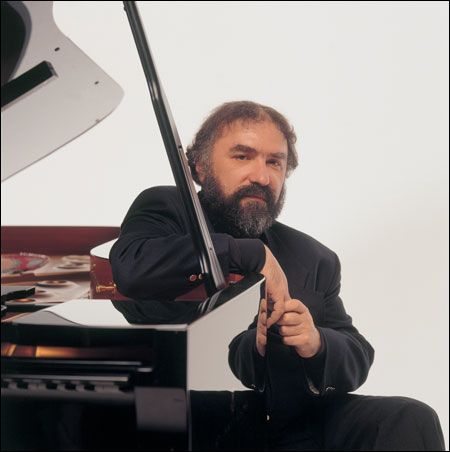
Romania’s ‘Painter at the keyboards’

Legendary pianist to make Korean debut
For local pianophiles, Romanian pianist Radu Lupu’s concerts in Seoul this month are the most anticipated classical music event of the year.
The legendary performer of the Austro-German classics has never given a concert here, although he has had 10 tours of Japan throughout his lengthy career.
The two upcoming concerts will be a rare opportunity for Korean audiences to hear one of today’s most respected interpreters of Schubert, along with Mitsuko Uchida, Andras Schiff and Murray Perahia.
In a previous radio interview, Japanese-British pianist Uchida called Lupu “possibly one of the greatest, most original musicians that I have encountered in my life.”
Schubert’s many lyrical gems for the piano are ideally suited for Lupu’s limpid, beautiful tone and use of subtle colors. Critics have defined him as a “painter at the keyboard.”
What is special about Lupu’s Seoul tour is that he will be playing the very pieces ― the Schubert Impromptus ― that established him as a Decca star in the 1970s.
For those who are interested in a preview of the Lupu sound, he has a distinguished discography on Decca. In particular, his recordings of the Schubert Impromptus and Mozart sonatas for piano and violin with violinist Szymon Goldberg are recommended for new listeners.
Due to his immense popularity among serious piano fans, concert organizer Mastmedia has spent a decade trying to make his Seoul debut a reality. The 66-year-old was due to give a recital here in 2010, but cancelled at the last minute because of illness.
The program on Nov. 17 at the Seoul Arts Center includes some of Schubert’s towering masterpieces ― the four Impromptus D. 935 and the Austrian composer’s last of 19 solo piano sonatas, the Sonata in B-flat major, D. 960. Schubert was a composer who highly admired Beethoven, and the latter’s influences are readily found in Schubert’s works, including the B-flat major sonata.
On Nov. 19, Lupu will play Beethoven piano concertos No. 3 and 4 at Seoul Arts Center.
Lupu’s singing sound comes from early studies at the studies at the Moscow Conservatory. He developed a special affinity with the Austro-German classics, from Mozart and Beethoven down to Brahms.
Lupu’s career was launched after phenomenal triumphs at the 1966 Van Cliburn Competition and the 1969 Leeds Competition.
Although trained in the Russian pianistic tradition, he is particularly noted for his interpretations of the great German and Austrian composers, especially Schubert, Brahms, Beethoven, and Mozart.
He is also noted for performances of works by the Czech composer Janacek and the Hungarian Bartok.
While Lupu has performed with all of the major orchestras of the world and at major music festivals, he is a somewhat reclusive figure, rarely giving interviews to journalists. In one rare published interview from 1991, Lupu expressed his philosophy of music-making as follows: “Everyone tells a story differently, and that story should be told compellingly and spontaneously. If it is not compelling and convincing, it is without value.”
Lupu has regularly performed as soloist and recitalist in the musical capitals and major festivals of Europe and the United States. He has appeared many times with the Berlin Philharmonic since his debut with that orchestra at the l978 Salzburg Festival under Herbert von Karajan, and with the Vienna Philharmonic, including the opening concert of the 1986 Salzburg Festival under Riccardo Muti. He is also a frequent visitor to the Royal Concertgebouw Orchestra and all of the major London orchestras. Lupu made his American debut in 1972 with the Cleveland Orchestra, with Daniel Barenboim conducting in New York City, and with the Chicago Symphony Orchestra, with Carlo Maria Giulini conducting.
Recorded legacy
He has made more than 20 recordings for Decca, including the complete Beethoven concertos with the Israel Philharmonic and Zubin Mehta, the complete Mozart violin and piano sonatas with Szymon Goldberg, and numerous solo recordings of Beethoven, Brahms and Schubert. His most recent London/Decca releases are of Schubert’s Sonatas, D. 960 and 664, which won a Grammy Award in 1995, and of Schumann’s “Kinderszenen,” “Kreisleriana” and “Humoresque,” which won an Edison Award in 1995.
Lupu has also made two records with pianist Murray Perahia (Sony Classical) and two albums of Schubert Lieder with soprano Barbara Hendricks (EMI). In 1998, for Teldec, he joined Daniel Barenboim for a disc of Schubert works for piano, four hands. In 2010, Decca re-issued a 10-CD collection of all of Lupu’s solo recordings to commemorate the 40th anniversary of the Grammy-award winning artist’s association with the company.
In his concert performances, Lupu does not use a piano bench, but instead an office chair, reminiscent of the great Canadian pianist and Bach specialist Glen Gould.
Lupu has participated in notable chamber music partnerships with, among others, violinist Goldberg, soprano Hendricks, his fellow pianist Perahia and violinist Chung Kyung-wha. <The Korea Times/Do Je-hae>


